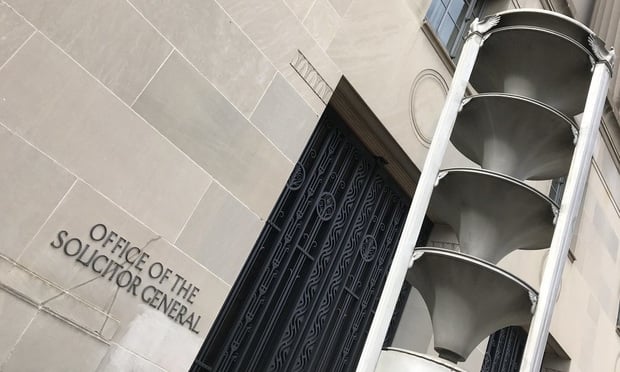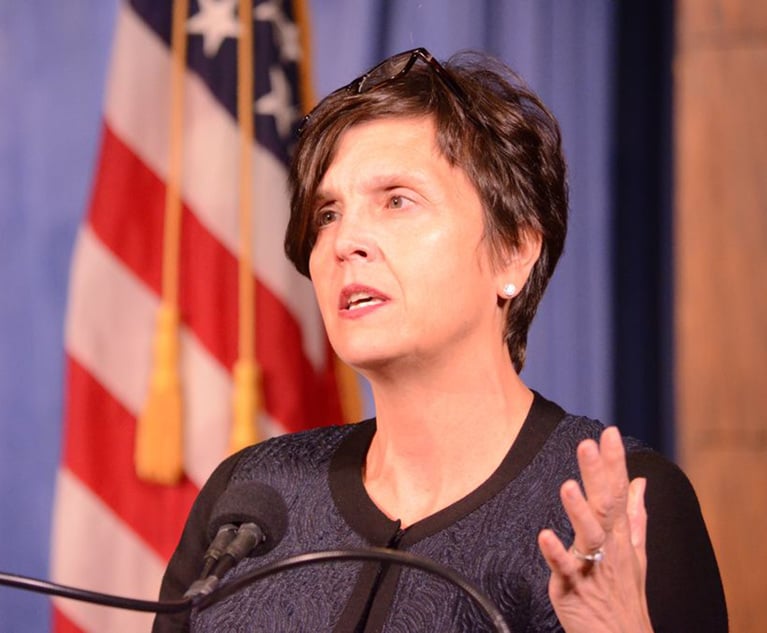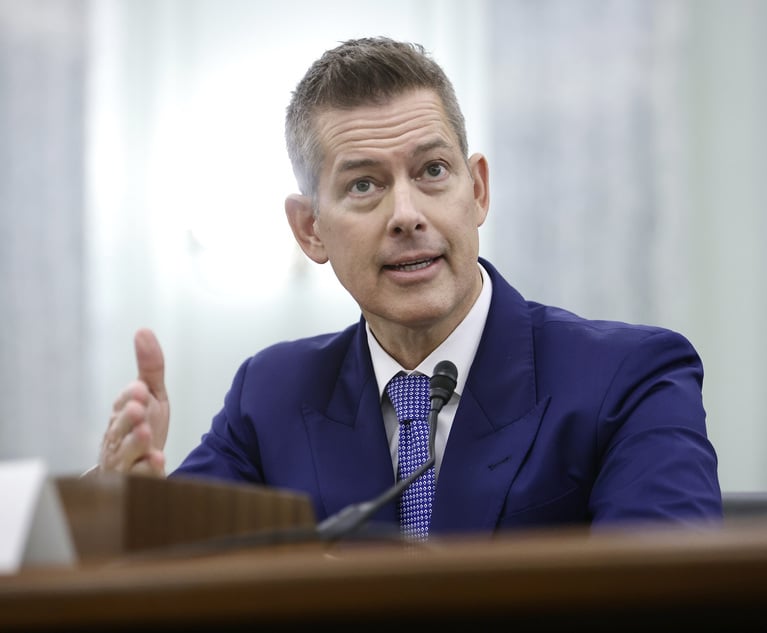In New Stance, DOJ Asks Justices to Shield Domestic Companies From 'Alien Tort' Liability
The U.S. Justice Department had argued twice before that corporations—whether domestic or foreign—were liable under the Alien Tort Statute.
May 29, 2020 at 03:28 PM
4 minute read
 Office of the Solicitor General at the Department of Justice in Washington, D.C. Credit: Mike Scarcella / NLJ
Office of the Solicitor General at the Department of Justice in Washington, D.C. Credit: Mike Scarcella / NLJ
The U.S. Justice Department is urging the U.S. Supreme Court to shield domestic corporations from liability in the U.S. for alleged violations of international law under the Alien Tort Statute, the opposite of what it argued before the justices just three years ago.
The Justice Department's new position came in a friend-of-the-court brief filed in two pending cases: Nestle USA v. John Doe I and Cargill v. Doe I. The cases stem from a lawsuit brought by former child slaves of Malian origin who claim they were trafficked and forced to work harvesting cacao beans on Ivory Coast plantations, which supplied the beans to Nestle and Cargill Inc. They seek damages for alleged forced labor and torture they suffered as a result of the alleged conduct either caused and/or aided and abetted by the corporations. Their case has been pending since 2006.
In the Supreme Court, Nestle, represented by Hogan Lovells partner Neal Katyal, and Cargill, represented by Mayer Brown partner Andrew Pincus, challenge a decision by the U.S. Court of Appeals for the Ninth Circuit. The appellate court ruled that domestic corporations may be held liable under the 1789 Alien Tort Statute and a cause of action for aiding and abetting a violation of international law existed under the statute.
The Justice Department had argued twice before that corporations—whether domestic or foreign—were liable under the statute: Kiobel v. Royal Dutch Petroleum Co. from 2013 and the 2018 case Jesner v. Arab Bank. In a fractured opinion in Jesner, the Supreme Court ruled that foreign corporations could not be held liable, but the justices left open the issue of domestic corporations.
In its Nestle-Cargill brief, U.S. Solicitor General Noel Francisco stated in a footnote that the justices' Jesner decision rejected the government's argument that corporate liability was appropriate because corporations were traditionally liable in tort actions at common law. He said the "United States has revisited its position in light of the court's opinion, which rejected not only the government's conclusion but also its basic framework for analysis."
Several international and tort law scholars questioned the Justice Department's reliance on Jesner for its change of heart on corporate liability.
One scholar, William Dodge of the University of California Davis School of Law, called the government's footnote "disingenuous" for justifying the changed position on what, he argued, was an inaccurate reading of the Jesner opinion.
Dodge, who filed an amicus brief supporting Jesner in 2017, said parts of Jesner that drew majority support are limited expressly to foreign corporations. "If you read the concurring opinions by Alito and Gorsuch, they emphasize the differences between domestic defendants and foreign defendants," Dodge said.
William Aceves of California Western School of Law said "Jesner was a fractured opinion and the government is relying, in part, on portions of Jesner that garnered fewer votes than the dissent. This is certainly not as conclusive as the government suggests."
The government's new position, Aceves added, also "overreaches" because it would preclude corporate liability "even in cases where every aspect of the litigation occurred in the United States. Such a categorical approach is not found in Jesner."
On the other hand, some scholars suggested that if Francisco is correct that the Jesner majority rejected the government's theory in that case, the Justice Department might feel "stuck" and compelled now to argue against domestic corporate liability.
"I think reasonable minds could debate whether the solicitor general 'had to take this new position in light of Jesner,'" another scholar said. "But I also think it could be valid to say that Jesner stands for nothing more than the bottom-line foreign corporations holding, such that the domestic corporations issue remains an open one that the solicitor general could argue either way."
The former child slaves are represented in the Supreme Court by longtime human rights litigator Paul Hoffman of Schonbrun Seplow Harris & Hoffman in Hermosa Beach, California. He argues that the justices should deny review of the petitions.
Read more:
EEOC Doesn't Sign Trump DOJ's Supreme Court Brief Against Transgender Employees
Trump's DOJ Switches Sides in Key Labor Case, Now Fights Class Actions
Sotomayor Confronts DOJ's Francisco About Switched-Up Position in Ohio Voter Case
This content has been archived. It is available through our partners, LexisNexis® and Bloomberg Law.
To view this content, please continue to their sites.
Not a Lexis Subscriber?
Subscribe Now
Not a Bloomberg Law Subscriber?
Subscribe Now
NOT FOR REPRINT
© 2025 ALM Global, LLC, All Rights Reserved. Request academic re-use from www.copyright.com. All other uses, submit a request to [email protected]. For more information visit Asset & Logo Licensing.
You Might Like
View All
'Lack of Independence' or 'Tethered to the Law'? Witnesses Speak on Bondi
4 minute read


DOT Nominee Duffy Pledges Safety, Faster Infrastructure Spending in Confirmation Hearing
Law Firms Mentioned
Trending Stories
- 1'A Death Sentence for TikTok'?: Litigators and Experts Weigh Impact of Potential Ban on Creators and Data Privacy
- 2Bribery Case Against Former Lt. Gov. Brian Benjamin Is Dropped
- 3‘Extremely Disturbing’: AI Firms Face Class Action by ‘Taskers’ Exposed to Traumatic Content
- 4State Appeals Court Revives BraunHagey Lawsuit Alleging $4.2M Unlawful Wire to China
- 5Invoking Trump, AG Bonta Reminds Lawyers of Duties to Noncitizens in Plea Dealing
Who Got The Work
J. Brugh Lower of Gibbons has entered an appearance for industrial equipment supplier Devco Corporation in a pending trademark infringement lawsuit. The suit, accusing the defendant of selling knock-off Graco products, was filed Dec. 18 in New Jersey District Court by Rivkin Radler on behalf of Graco Inc. and Graco Minnesota. The case, assigned to U.S. District Judge Zahid N. Quraishi, is 3:24-cv-11294, Graco Inc. et al v. Devco Corporation.
Who Got The Work
Rebecca Maller-Stein and Kent A. Yalowitz of Arnold & Porter Kaye Scholer have entered their appearances for Hanaco Venture Capital and its executives, Lior Prosor and David Frankel, in a pending securities lawsuit. The action, filed on Dec. 24 in New York Southern District Court by Zell, Aron & Co. on behalf of Goldeneye Advisors, accuses the defendants of negligently and fraudulently managing the plaintiff's $1 million investment. The case, assigned to U.S. District Judge Vernon S. Broderick, is 1:24-cv-09918, Goldeneye Advisors, LLC v. Hanaco Venture Capital, Ltd. et al.
Who Got The Work
Attorneys from A&O Shearman has stepped in as defense counsel for Toronto-Dominion Bank and other defendants in a pending securities class action. The suit, filed Dec. 11 in New York Southern District Court by Bleichmar Fonti & Auld, accuses the defendants of concealing the bank's 'pervasive' deficiencies in regards to its compliance with the Bank Secrecy Act and the quality of its anti-money laundering controls. The case, assigned to U.S. District Judge Arun Subramanian, is 1:24-cv-09445, Gonzalez v. The Toronto-Dominion Bank et al.
Who Got The Work
Crown Castle International, a Pennsylvania company providing shared communications infrastructure, has turned to Luke D. Wolf of Gordon Rees Scully Mansukhani to fend off a pending breach-of-contract lawsuit. The court action, filed Nov. 25 in Michigan Eastern District Court by Hooper Hathaway PC on behalf of The Town Residences LLC, accuses Crown Castle of failing to transfer approximately $30,000 in utility payments from T-Mobile in breach of a roof-top lease and assignment agreement. The case, assigned to U.S. District Judge Susan K. Declercq, is 2:24-cv-13131, The Town Residences LLC v. T-Mobile US, Inc. et al.
Who Got The Work
Wilfred P. Coronato and Daniel M. Schwartz of McCarter & English have stepped in as defense counsel to Electrolux Home Products Inc. in a pending product liability lawsuit. The court action, filed Nov. 26 in New York Eastern District Court by Poulos Lopiccolo PC and Nagel Rice LLP on behalf of David Stern, alleges that the defendant's refrigerators’ drawers and shelving repeatedly break and fall apart within months after purchase. The case, assigned to U.S. District Judge Joan M. Azrack, is 2:24-cv-08204, Stern v. Electrolux Home Products, Inc.
Featured Firms
Law Offices of Gary Martin Hays & Associates, P.C.
(470) 294-1674
Law Offices of Mark E. Salomone
(857) 444-6468
Smith & Hassler
(713) 739-1250










